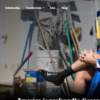Boeing’s CEO defended his record amid accusations that the company had put its financial health over the safety of its planes, asserting that new policies had been put in place to correct past issues.
At a Senate hearing Tuesday, Dave Calhoun, who in March said he planned to step down as CEO by the end of the year, said he did not plan to resign even as he faced blistering criticism about the company’s safety performance.
‘I’m sticking this through,’ Calhoun said in response to a question from Sen. Josh Hawley, R-Mo., about why he had not yet stepped down as the company amid fresh new of concerns about its practices — just three years after it agreed to a settlement with the Justice Department over its role in two crashes that killed 364 people.
While the immediate reason for Tuesday’s hearing was the blowout of a door panel on an Alaska Airlines flight in January, subsequent revelations about Boeing, its safety and maintenance practices and especially its handling of whistleblowers have led to fresh concerns about the company’s culture.
“This past January, the facade quite literally blew off the hollow shell that had been Boeing’s promises to the world,” Sen. Richard Blumenthal, D-Conn., said in prepared remarks. “And once that chasm was exposed, we learned that there was virtually no bottom to the void that lay below.”
David Calhoun in Berlin on June 4, 2024.Krisztian Bocsi / Bloomberg via Getty Images file
Calhoun, who first joined Boeing as a director in 2009, announced in March that he planned to step down as CEO by the end of this year. He told the panel Tuesday that he still planned to eventually leave the company — although a successor has not yet been named.
While Calhoun was not directly in charge of Boeing at the time of the deadly 737 Max crashes that occurred in a five-month span between 2018 and 2019, he had already become lead independent director by 2018. He was appointed CEO in 2020 following the ouster of Dennis Muilenburg, who’d held the role since 2015.
Calhoun’s arrival was supposed to have ushered in a new safety culture. Critics say that did not seem to happen.
Asked Tuesday about Boeing’s harsh treatment of whistleblowers, including John Barnett, a longtime Boeing engineer who authorities say took his own life, Calhoun acknowledged ‘something went wrong’ and said the company has an ethics hotline and a team in place to handle internal concerns.
However, Calhoun also said he had not individually met with any whistleblowers who had stepped forward.
‘I think it would be a good idea’ to do so, he admitted under questioning from Blumenthal.
In the hours leading up to Calhoun’s appearance on Capitol Hill Tuesday, the subcommittee released new whistleblower claims from a Boeing quality assurance investigator who accused the company of retaliating against him for flagging that Boeing was likely installing damaged or improper parts on planes and hiding the parts from FAA inspectors.
A Boeing spokeswoman said the company received the claims Monday night and that its staff was reviewing them.
Boeing remains the subject of inquiries by the Justice Department and the Federal Aviation Administration.
Last month, the Justice Department said Boeing had violated a 2021 settlement struck in the wake of the deadly 737 Max incidents by failing to implement a required compliance and ethics program — though it did not reveal what specific violations had occurred.
Boeing has disputed the Justice Department’s finding. Still, the department is now weighing whether to pursue charges against the company, though it is rare for settlements to be reversed.
In a March interview with NBC News, FAA Administrator Michael Whitaker said Boeing’s priorities “have been on production and not on safety and quality.”
“They need to make safe airplanes or they will be capped at a production level that’s not sustainable,” he said. “So I’m confident that they’ll get there.”
In a letter to clients in November 2023 — two months before the January blowout incident — Richard Aboulafia, managing director at AeroDynamic Advisory and a leading aerospace analyst, accused Calhoun of perpetuating ‘a dysfunctional culture’ at Boeing.
‘What’s Calhoun’s rationale for abolishing the company-wide strategy department? Cost-cutting is an obvious explanation,’ Aboulafia wrote.
‘Per my December 2019 letter, the longer Calhoun stayed, the longer it would become clear that shareholder returns was his sole focus. At the four-year mark, that is all too dismally obvious,’ he said.













